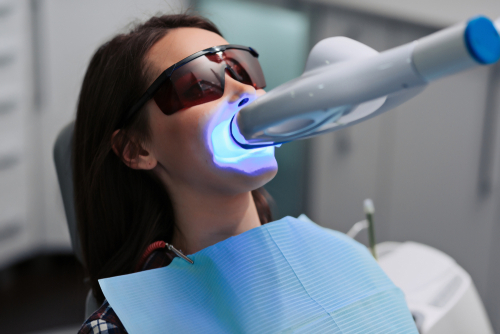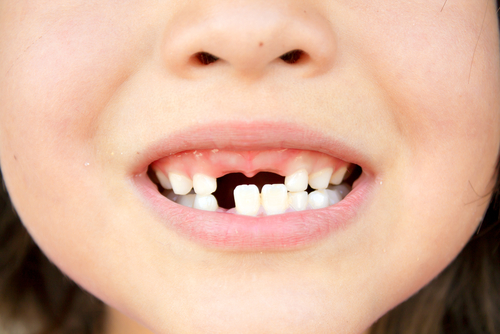
What Happens If I Don’t Pull Out Wisdom Tooth?
December 9, 2021
Are There Any Side Effects With Teeth Whitening?
February 14, 2022Why Are My Child’s Teeth Not Growing?

Why Are My Child’s Teeth Not Growing? Are you worried that your child’s teeth aren’t growing? There are several reasons that a child’s tooth may not grow, but don’t panic. Many children go through phases where their teeth grow in and out, sometimes even multiple times. Your child’s age is an important factor to take into consideration when thinking about why your child’s teeth aren’t growing.
Teeth begin to grow when a baby reaches six months. However, this process can last through the age of three, and sometimes beyond. Here are 10 reasons why your child’s teeth may not be growing:
1) Genetics
Table of Contents

Genetics is perhaps the number reason why a child’s teeth are not growing. Certain genetic conditions can cause issues with tooth growth, including hypodontia and dentinogenesis imperfect. If you have any family history of dental problems, it is best to speak with your dentist or doctor before the problem becomes worse.
For example, if your child’s parent had trouble growing teeth, it would be good to have your child’s teeth checked for any issues at a young age. There is no cure for genetic conditions, but good oral hygiene and dental care can help to prevent the teeth from becoming worse.
2) Food allergies or intolerances

Food allergies or intolerances can cause problems with tooth growth due to the food’s ability to affect your child’s general health. If your child is eating a lot of acidic foods, such as carbonated drinks, citrus fruits, or vinegar, it can cause tooth enamel to wear down.
This will make the teeth more susceptible to decay and can also lead to problems with tooth growth. If you believe that your child may have a food allergy or intolerance, speak with your doctor about testing for this.
3) Poor oral hygiene

If your child is not brushing their teeth regularly or is not using the correct type of toothbrush, it can lead to problems with tooth growth. Poor oral hygiene can also lead to plaque buildup on the teeth, which can cause decay. Make sure that your child is brushing their teeth at least twice a day for two minutes each time, and using fluoride toothpaste.
4) Medications

Certain medications can cause problems with tooth growth. If your child is taking any medications that list tooth decay or enamel loss as a side-effect, it is important to speak with your doctor about this. Some medications can be switched to a different type that does not have these effects, or your doctor may be able to prescribe a mouthwash for you to use alongside the medication.
5) Fluoride deficiency

Fluoride is an important mineral that can strengthen your child’s teeth and reduce the risk of decay. If your child is not receiving adequate fluoride, such as by drinking fluoridated water or using toothpaste with fluoride, it can lead to problems with tooth growth. Fluoride helps to protect and strengthen the enamel of your teeth, which makes them resistant to decay.
Speak with your dentist about how you can increase the amount of fluoride in your child’s diet.
6) Tooth trauma

If a tooth has been knocked out or broken, it will not grow incorrectly. If your child has experienced any type of tooth trauma, it is important to seek dental care as soon as possible. Depending on the severity of the injury, your dentist may be able to fix the tooth or may need to perform a surgical procedure.
7) Dental cavities

If a tooth is infected with decay, it will not grow incorrectly. Cavities are a common problem in young children and can cause a lot of pain. If your child has any cavities, it is important to have them treated by a dentist.
8) Lack of vitamin D

Vitamins are important for strong bones and teeth. If your child is not getting enough vitamin D, it can lead to problems with tooth growth. Vitamin D can be found in foods such as salmon, eggs, and milk, or you can speak with your doctor about taking a supplement. Vitamin D deficiency is very common in infants and young children, so it is important to pay attention to this.
9) Tumors

Tumors can cause growths that interfere with tooth development. If your child has a tumor near the jaw or any other area of the mouth, it can cause problems with tooth growth. Any type of tumor should be treated as soon as possible by a medical professional.
10) Injuries or abnormalities of the mouth

Injuries or abnormalities of the mouth can make it difficult for teeth to grow normally. If your child has any injuries, such as from sports, you need to pay attention to how it affects their teeth and make sure that they are clean and healthy. If your child has any abnormalities in the mouth, such as cleft palate or hare lip, it can also affect tooth growth.
11) Overbite

An overbite is when the upper teeth protrude over the lower teeth when biting down. If your child has an overbite with permanent teeth, it can cause overcrowding and lead to problems with tooth growth. Overbite is often associated with thumb-sucking or pacifier habits, so if your child still sucks their thumb or uses a pacifier, it can affect the jaw and how teeth grow.
12) Underbite
An underbite is when the lower teeth protrude over the upper teeth when biting down. If your child has an underbite, it can cause the lower jaw to be too small for permanent teeth, which will not grow correctly. As with overbites, thumb-sucking or pacifier habits often lead to underbite because they affect how the jaw grows.
13) Crossbite
A crossbite is when the upper and lower teeth do not line up correctly. If your child has a crossbite, it can cause overcrowding in the mouth, which means that some teeth will not grow. As with overbites and underbites, thumb-sucking or pacifier habits are often associated with crossbite because they affect how the jaw grows.
14) Thumb-sucking and pacifier habits

If your child sucks their thumb or uses a pacifier, it can affect the growth of their teeth. If they suck only during sleep, it should not cause problems because the sucking will stop as soon as they wake up. If they suck both during and after sleep, this can cause the jaw to grow incorrectly. Pacifier use should also be limited because it can cause the same problems as thumb-sucking.
Why Are My Child’s Teeth Not Growing? – Conclusion
If your child is experiencing any of these problems with tooth growth, it is important to visit the dentist. Many of these issues can be corrected with dental treatment, and early intervention is often the best course of action.




